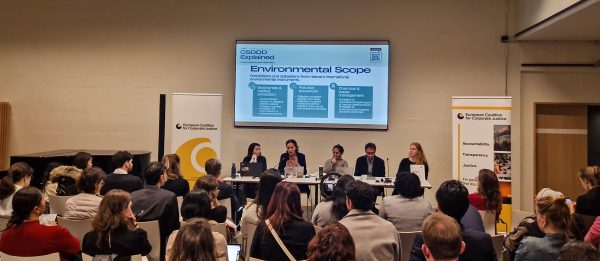This website uses cookies so that we can provide you with the best user experience possible. Cookie information is stored in your browser and performs functions such as recognising you when you return to our website and helping our team to understand which sections of the website you find most interesting and useful.

During 2024’s UN forum on Business and Human Rights, ECCJ organised a side-event in collaboration with the Clean Clothes Campaign and FIDH (International Federation for Human Rights) in Geneva. Under the title “CSDDD Explained: Practical insights for global rightsholders,” this session gathered over 60 representatives from international organisations, civil society, trade unions, and communities from around the world.
With the idea to conveying what actionable measures the EU Corporate Sustainability Due Diligence Directive (CSDDD) offers for those facing corporate human rights and environmental abuse, the session offered practical tools to rightsholders, civil society organisations, and trade unions to monitoring the application and enforcement of the Directive. Moreover, ECCJ introduced a CSDDD summary (available in English, French, and Spanish) as well as a Transposition Guide on the CSDDD.

Takeaways and insights from the discussion
From generally outlining the content of the directive to discussing the practical implications of stakeholder engagement, civil liability, and grievance mechanisms, the panel highlighted the challenges and opportunities in ensuring this landmark directive becomes actionable in the hands of those at the frontlines for effectively prevent harms, deliver justice when is due and lead the way to systemic change.
1. The CSDDD as a practical tool for global corporate accountability
The CSDDD represents a landmark step in binding legislation aimed at addressing corporate impacts on human rights and the environment across global value chains. Building upon frameworks like the OECD Guidelines and UN Guiding Principles, the directive mandates companies to identify, mitigate, and remedy adverse human and environmental impacts in their own operations but also by their business relationships throughout most activities in a value chain, no matter where it happens. However, concerns remain about the limited scope of huma rights and environmental abuses covered, the exemptions on the coverage of certain downstream value chain activities and a confined liability regime. Hence, ensuring effective implementation will depend on robust State oversight mechanisms and proactive engagement by civil society actors to hold corporations accountable and prevent circumventing practices that uphold impunity.
2. Making stakeholder engagement meaningful and effective
One cornerstone of the directive is its emphasis on meaningful stakeholder engagement, which must be ongoing, two-way, responsive to stakeholders’ views, and inclusive of peoples in positions of vulnerability or marginalization. The directive stipulates that engagement should occur throughout of the due diligence process and it should be timely, accessible, appropriate, and safe for stakeholders. Stakeholders are broadly defined, thus while an emphasis is given to affected stakeholders, Trade unions, Indigenous communities, and civil society organisations can play a central role in the engagement process.
However, challenges persist in ensuring this engagement translates into genuine dialogue rather than box-ticking exercises. Engaging selectively with stakeholders while excluding critical voices—including those who might highlight risks, challenges, or harms in business operations or supply chains— violates the directive’s explicit requirement for inclusive and meaningful engagement. Moreover, companies are required to systematically address barriers to participation, such as retaliation risks — which could include intimidation, threats, job loss, or other punitive actions by companies or their associates — to ensure stakeholders can participate without fear. These challenges underline the need for stringent monitoring mechanisms to ensure compliance at all levels.

3. Ensuring fair access to justice and civil liability
The civil liability provisions in the CSDDD are a potential game-changer for victims seeking redress. The provisions allow claims for harm caused as the result of due diligence failures, providing access to financial compensation and injunctive measures to prevent further harm. Notably, the directive lowers procedural barriers such as financial costs and time limitations. It also creates avenues for representative actions through EU-based trade unions, NGOs and National Human Rights Institutions, and enables victims to access information via judicial requests.
However, important gaps include: the scope of liability does not cover harms caused solely by business partners; not all obligations set out by the CSDDD are covered by the regime; collective rights are not explicitly protected; and the directive does not address the question of the burden of proof. These limitations could significantly restrict access to justice for many affected communities, highlighting the necessity for collaborative efforts between EU-based organisations and their global counterparts. The success of these measures hinges on vigilant enforcement by EU member states, stakeholder monitoring and continued advocacy to close existing loopholes.
4. Notifications and multiple pathways for addressing complaints
The directive’s provisions for company-level complaints mechanisms offer an essential but limited, pathway for addressing grievances. The notifications and complaints mechanisms outlined in the CSDDD aim to provide workers, communities, and other stakeholders with a way to report corporate harm or risks through company-level systems. Companies must establish transparent, predictable, and fair procedures to handle complaints, ensuring confidentiality and non-retaliation protections. Beyond this, the ability to raise substantiated concerns directly with supervisory authorities or to bypass complaints mechanisms in favour of litigation expands options for redress. For example, a worker reporting unsafe conditions must be protected from retaliation, while communities harmed by pollution can escalate concerns if companies fail to act. Effective monitoring of how companies integrate complaints into their due diligence processes will be crucial to maintaining accountability and ensuring these mechanisms drive meaningful change. Importantly, any remedial actions taken via company procedures do not preclude the imposition of penalties nor civil liability, this means that affected stakeholders have the right to bring their claims forth to national authorities and courts as well as to companies directly as they consider appropriate and without the different procedures interfering with each other.
Watch the recording











